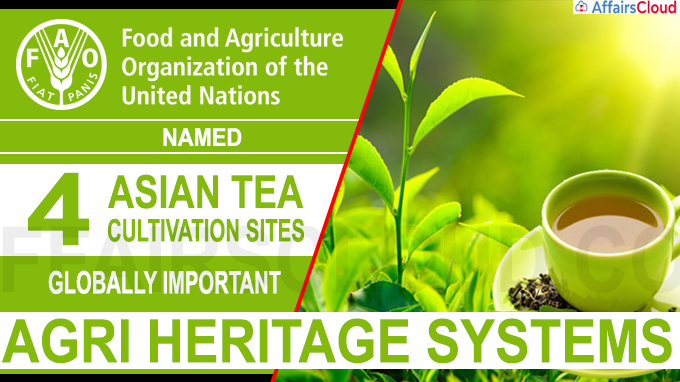
The list of sites are:
| Site | Country |
|---|---|
| The Pu’er Traditional Tea Agrosystem | China |
| Fuzhou Jasmine & Tea Culture System | China |
| Traditional tea-grass integrated system in Shizuoka | Japan |
| Traditional Hadong Tea Agrosystem in Hwagae-myeon | South Korea |
About the 4 sites:
The Pu’er Traditional Tea Agrosystem in China:
The Pu’er Tea Agroecosystem in Yunnan is the world’s largest area of tea forest plantations established by village ancestors thousands of years ago. Yunnan Province (China) is considered as the World’s origin place for tea trees.
Fuzhou Jasmine Tea Site in China:
The Fuzhou Jasmine and Tea Culture System developed over more than 2000 years is rich in biodiversity.
Traditional Tree Grass system in Shizuoka, Japan:
This site uses Chagusaba technique in the production of tea which is considered to be a sustainable method.
Traditional Hadong Tea Agrosystem, South Korea:
The tradition of tea cultivation at this site goes back to at least 1200 years.
Key Points:
i.GIAHS is an initiative started by FAO in 2002 for the identification & conservation of traditional agricultural systems all over the world. These sites also represent models of sustainable agriculture production.
ii.Some major factors which go into selection of sites of tea production are Idea of Sustainability, ancient traditions.
Reason for India’s absence:
India being the 2nd largest tea producing country (China being the 1st) of the world does not find even 1 tea site in the list because the practice of tea cultivation is not ancient in India. Tea plantation & cultivation in India were introduced by the British Colonists during the 19th Century.
List of Indian sites in GIAHS:
There are 3 recognised GIAHS sites in India.
- Koraput Traditional Agriculture recognised in 2012
- Kuttanad Below Sea Level Farming System recognised in 2013
- Saffron Heritage of Kashmir recognised in 2011
Recent Related News:
i.The 35th Session of the FAO Regional Conference for Asia and the Pacific (APRC 35) hosted by Bhutan at its capital Thimphu, was held virtually from 1-4 September 2020 virtually.
About Food & Agriculture Organization (FAO):
Director General – Qu Dongyu
Headquarters– Rome, Italy